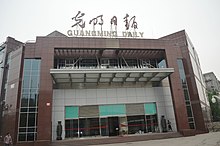Guangming Daily
ISSN 1002-3666 | | |
| Website | www | |
|---|---|---|
| Guangming Daily | |
|---|---|
Hanyu Pinyin | Guāngmíng Rìbào |
| Wade–Giles | Kuang-ming Jih-pao |

The Guangming Daily, also known as the Enlightenment Daily,
History
The Guangming Daily, then romanized as Kuangming, was launched on 16 June 1949 in Beijing. It was originally the official newspaper of the China Democratic League, but later became the Chinese Communist Party's official organ for China's educated elite.[3]
During the Cultural Revolution (1966–1976), Guangming Daily was one of the only three national newspapers that remained in circulation, together with the People's Daily and the People's Liberation Army Daily, and the sole magazine Red Flag. The four periodicals, known as "the three papers and one magazine", dominated China's public affairs. For safety reasons, regional newspapers and specialist magazines all took cues from the big four, and largely reprinted articles from them.[4]
Before the death of Mao Zedong, the paper fell under the control of the radical left-lean Gang of Four led by Mao's widow Jiang Qing. In October 1976, Vice Premier Ji Dengkui played a significant role in taking over the Guangming Daily, helping Mao's successor Hua Guofeng oust the Gang of Four and put an end to the Cultural Revolution.[5]
In 1978, the
Since November 1982, it was run by the Chinese Communist Party. In 1984, it was officially recognized as an institution directly under the Chinese Communist Party and supervised by the Central Propaganda Department of the Chinese Communist Party.[2]
In 1998, Guangming Daily launched its official website, which was one of the earliest news websites in China.[8]
Two Guangming Daily journalists, Xu Xinghu (许杏虎) and his wife Zhu Ying (朱颖), were killed on the night of 7 May 1999 in the United States bombing of the Chinese embassy in Belgrade during the NATO bombing of Yugoslavia.[9]
The Guangming Daily has been documented to have been used as cover by Ministry of State Security (MSS) officers posing as journalists overseas.[10][11]
Circulation
Guangming Daily's circulation reached 1.5 million in 1987, but as independent publications flourished during the Reform and Opening era, it dropped to 800,000 in 1993.[3]: 167 To survive in the market, it reduced political coverage and propaganda, and increased its coverage on culture and science.[3]: 167
Notable people
The Beijing News
In 2003, Guangming Daily partnered with the Nanfang Media Group (publisher of the highly successful Southern Weekly) to jointly publish The Beijing News, which quickly became one of Beijing's most influential newspapers.[14]
References
- ISBN 978-0-521-24336-0.
- ^ a b 张宁. "传播光明的使者". Guangming Daily. Archived from the original on 11 August 2011. Retrieved 12 August 2011.
- ^ ISBN 978-0-252-06678-8.
- ISBN 978-1-107-02141-9.
- ISBN 978-0-7864-3582-1.
- ^ a b 光明日报: 第一个取掉报眼上的毛主席语录. Phoenix Television (in Chinese). 24 February 2010. Archived from the original on 2 July 2019. Retrieved 18 April 2017.
- ^ Zeng, Tao. 关于真理标准问题的讨论. People's Daily (in Chinese). Archived from the original on 19 April 2017. Retrieved 12 July 2017.
- ^ "About GMW.cn". Guangming Online. 31 August 2012. Archived from the original on 7 May 2019. Retrieved 13 July 2017.
- ^ Ponniah, Kevin; Marinkovic, Lazara (7 May 2019). "The night the US bombed Chinese embassy". BBC News. Archived from the original on 30 March 2020. Retrieved 7 May 2019.
- OCLC 1347020692.
- ^ McKenzie, Nick (3 March 2024). "China revealed as country behind spy chief's unnamed 'A-Team'". The Sydney Morning Herald. Archived from the original on 3 March 2024. Retrieved 4 March 2024.
Former defence official Paul Monk confirmed to this masthead that, in 1995, ASIO warned him that the same Chinese journalist– who introduced himself to Monk as a Guangming Daily newspaper reporter while Monk worked at the Defence Intelligence Organisation – was an MSS operative stationed in Australia.
- from the original on 24 April 2023. Retrieved 24 April 2023.
- from the original on 23 August 2023. Retrieved 24 April 2023.
- ISBN 978-1-315-66611-2.
